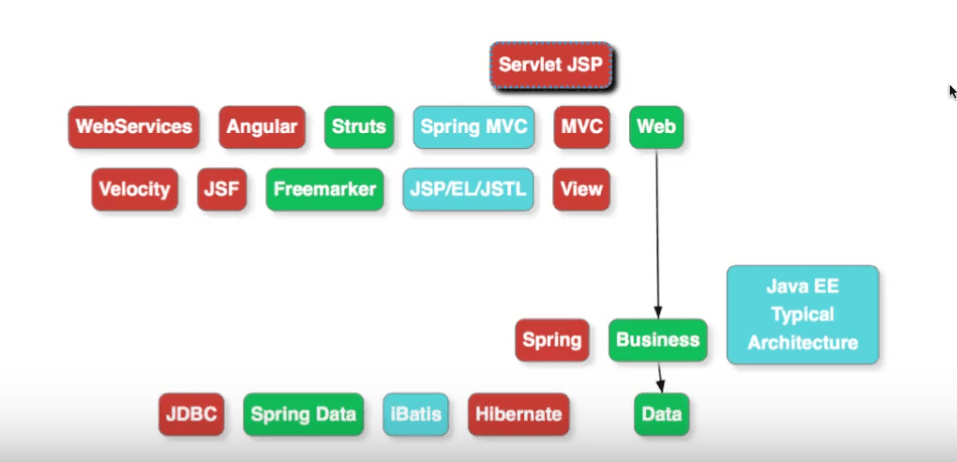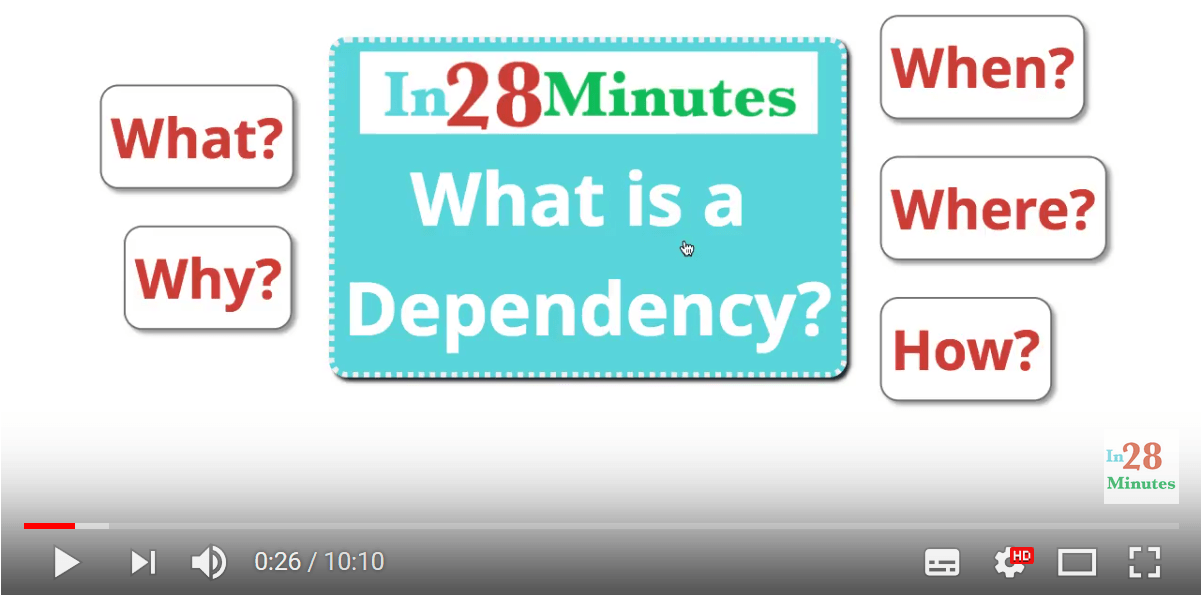Spring Basics: What Is a Dependency?
Learn more about the most important aspect of the Spring Framework — dependency injection.
Join the DZone community and get the full member experience.
Join For FreeThe most important feature of the Spring Framework is dependency injection. To understand dependency injection, you first need to understand the concept of dependencies.
We Will Learn
- What is a dependency?
- How are applications built? How is one layer dependent on another?
- How is a class dependent on another?
- How does the Spring Framework perform dependency injection?
In this article, we have a look at what a dependency is in general and in the context of the Spring Framework.
Dependencies at a High Level
We build enterprise applications in multiple layers: 
A typical Java application will have three layers in its architecture: web, business, and data.
- The web layer
- The business layer
- The data layer
In the above scenario:
- The web layer depends on the business layer. The business layer is a dependency of the web layer.
- The business layer depends on the data layer. The data layer is a dependency of the business layer.
Dependencies at Class Level
Let’s look at an example:
@Service
public class ClientBOImpl implemented ClientBO {
@Autowired
ProductDO productDO;
@Autowired
ClientDO clientDo;
@Override
public Amount getClientProductsSum(long cliendId) {
//...
}
@Override
public void saveChangedProducts(long clientId,
List<Product> userEnteredProducts) {
//...
}
//...
}ClientBOImpl is the business class, and it makes use of two data layer classes — ProductDO and ClientDO.
Let’s now have a look at the business logic within ````ClientBOImpl```:
getClientProductsSum(): This returns the sum of all products for a given client.saveChangedProducts(): When products are modified on the application page, this method is called.
Both methods in ClientBOImpl need either ProductDO or ClientDO. ProductDO and ClientDO are dependencies of ClientBOImpl.
Inputs/Outputs Are Not Dependencies
If you look at public Amount getClientProductsSum(long clientId), clientId is merely an input, not a dependency. Similarly, the total calculated amount returned by getClientProductsSum is an output, not a dependency.
A Few More Examples of Dependencies
Example 1
Have a look at the following code:
@Component
public class ComplexAlgorithmImpl {
@Autowired
private SortAlgorithm sortAlgorithm;
//...
}
public interface SortAlgorithm {
public int[] sort(int[] numbers);
}
@Component
public class QuickSortAlgorithm implements SortAlogrithm {
//...
}ComplexAlgorithmImpl performs a lot of complex logic, and sorting is one of the steps.
The SortAlgorithm is a dependency of ComplexAlgorithmImpl.
Since SortAlgorithm is an interface, you can easily change the actual sort algorithm used by ComplexAlgorithmImpl without changing its code.
Example 2
Consider the following code:
import java.sql.ResultSet;
@Repository
public class PersonJdbcDao {
@Autowired
JdbcTemplate jdbcTemplate;
class PersonRowMapper implements RowMapper<Person> {
@Override
public Person mapRow(ResultSet rs, int rowNum) throws SQLException {
//...
}
//...
}
}To execute a query on the database, PersonJdbcDao needs JdbcTemplate. Therefore, JdbcTemplate is a dependency of PersonJdbcDao.
Let’s look at a simple method:
public Person findById(int id) {
return jdbcTemplate.queryForObject(//...);
}id is the input for this method, and the output returned is of type Person.
In the above method, we are making use of the dependency jdbcTemplate . The inputs and outputs are not dependencies.
Do check out our video on the same topic:
Summary
In this article, we focused on the most important concept in Spring Framework — dependency.
Stay tuned for more posts on Spring Framework basics!
Published at DZone with permission of Ranga Karanam, DZone MVB. See the original article here.
Opinions expressed by DZone contributors are their own.


Comments